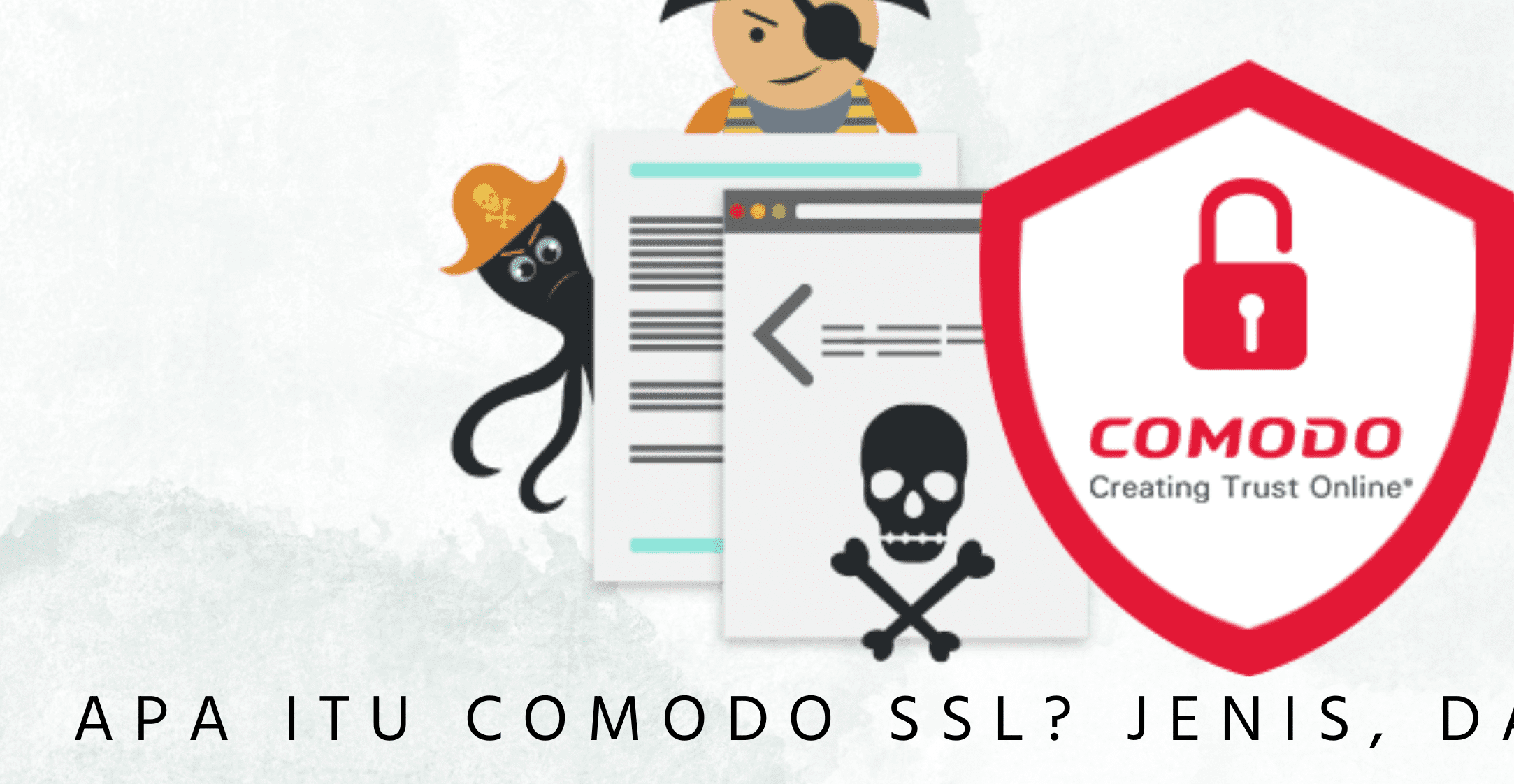Title: What is Comodo SSL? Types and Uses
For You. Get More Information from our site @iwanrj.com free.
Have you ever heard of the term Comodo SSL? For information, Comodo SSL is a DV type SSL certificate belonging to the Comodo brand which is very easy to use on websites because it only requires email verification.
Making this certificate only requires a 10-minute process and is fairly economical to secure your customer transactions. More importantly, your customers will rest assured that it is safe to do business with you because sensitive information is encrypted and remains private.
What is Comodo SSL?
Comodo SSL is a brand of Secure Socket Layer (SSL) certificate provider. SSL itself is the technology needed to secure communication and data transfer between web servers and users.
With SSL, sensitive information such as credit card numbers, passwords and other important data can be protected. This is because SSL performs encryption alias deliberately randomizes the data structure. So, hackers find it difficult to know the correct data.
Well, Comodo SSL is also in charge of securing websites with encryption. How does SSL encryption work in securing websites? We summarize a brief explanation below:
- The browser requests SSL certificate information for the website page to the server. Usually in shape https://.
- The server replies by sending the same SSL certificate and public key information.
- The browser checks if the certificate is valid. Is the certificate issued by a trusted party? Is the certificate still valid? And, is that certificate associated with the site in question?
- The browser uses the public key to generate a special encryption code and sends it to the server.
- The web server decrypts the encryption key or in other words does the “decryption”.
- After that, the server and browser can send data to each other safely. The server sends back data in random or encrypted form.
- The browser returns to decrypt the data so that the information can be displayed to the user.
Comodo has become one of the biggest brands in the cyber security industry. Comodo has 700 thousand customers and 8,000 global partners. This one SSL brand has also issued more than 100 million certificates and dominates 42% of the SSL market.
What makes Comodo special and one of the biggest SSL provider brands? Here’s the answer:
- Authentication. Comodo verifies the identity of the individual, business and organization that owns the website. That way, website visitors can ensure website integrity more easily.
- Information security. Comodo uses a universally trusted Public Key Infrastructure to encrypt data at all stages of data transfer.
- Website security. With cWatch from Comodo SSL, you can protect your website from various security threats while improving website performance.
- Security of credit card data transactions. With PCI (Payment Card Industry) signing, you can maintain the security of credit card transactions and data.
- Code signing. Comodo practices cryptographic signing of software. So that the operating system and its users can verify its security.
- Malware signing. Comodo uses code signing certificates used to prevent malware attacks.
- Vulnerability assessment. Comodo uses this process to identify vulnerabilities in computer systems, applications, and network infrastructure.
Types of Comodo SSL
Because each website has its own needs, it is important for you to know what types of Comodo SSL certificates are.
Comodo SSL divides its certificate types into two categories. The first, according validation level. The second, based on certificate function. So, before you decide which certificate to buy, first see the explanation below:
For an SSL certificate to do its job, a certificate authority may only issue certificates to organizations whose identities have been validated. Therefore, the certificate authority divides several SSLs according to their validation.
The following types of certificates according to their validation level:
-
Domain validation (DV) SSL certificates
Perfect for: growing business websites and small organizations.
DV SSL is a type of Comodo SSL which is at the basic level. This certificate is suitable for websites that only require encryption. No more.
Besides the low price, activation can be done in just a matter of minutes. That’s because the validation process runs automatically. All you need to do is prove that a domain is yours, and voila! You get a DV SSL certificate.
-
Organization validation (OV) SSL certificates
Suitable for: Business websites and mid-sized organizations.
This type of certificate is a type of certificate at the medium security level. To get an OV SSL certificate, your company or organization must undergo a light business inspection.
This examination process can take quite a long time, which is about three days. Why? Because all business information that you have must be verified first.
Apart from that, this OV SSL certificate also allows your customers to be able to check your business verification information in the section certification details.
-
EV (Extended Validation) SSL certificates
Suitable for: large-scale business and organization websites with large traffic.
This type of Comodo SSL provides the highest level of security. EV SSL certificate keeps your website safe from phishing attacks, email scams, and other cyber attacks. So automatically customer trust also increases.
In addition, this EV SSL certificate has a unique visual indicator when it has been activated. Your organization name will appear in the browser in green. Like this for example:

To make it easier for you to understand the three types of Comodo SSL above. As well as what products are included in it. We have summarized them in the table below:
| Information | Domain Validation | Organization Validation | Extended Validation |
| Superiority | Encrypted | Organization details on certificate info. | Highest level of security. |
| Facility | Validation on domain control. | Domain certificate. | Organizational authentication standard for industry. |
| Activation | SSL will be active (with a padlock in the browser) in just a few minutes. | Address bar is blue for Firefox.SSL users will be active, and a padlock sign will appear, approximately 1-2 days. | The business name and padlock in the Address bar are green. It takes 7-10 days for SSL to activate and the padlock appears in the browser. |
| Suitable for: | Perfect for growing businesses. | Suitable for medium scale businesses. | Suitable for PT, CV, State departments. |
| Product | PositiveSSL (DV)EssentialSSL (DV)EssentialSSL Wildcard (DV)PositiveSSL Wildcard (DV)Comodo SSL Wildcard Certificate (DV)Comodo SSL Certificate (DV) | InstantSS (OV)InstantSSL Premium (OV)Comodo UCC (OV)InstantSSL Pro (OV)Comodo Multi-Domain SSL (OV)InstantSSL Premium Wildcard (OV) | Comodo EV Multi-Domain Comodo EV SSLPositiveSSL EVPositiveSSL EV Multi-DomainEnterpriseSSL Pro with EVENterpriseSSL Pro with EV |
-
SSL single domain certificate
Suitable for: Websites with a single domain.
As the name suggests, a single domain Comodo SSL certificate can only be used by one domain or one IP address. Excess of type single domains is that the SSL certificate exists for all validation levels.
-
SSL Multi-Domain Certificate
Suitable for: Websites that have multiple domains.
With this SSL certificate, you can secure multiple domains with only one certificate. Another advantage of having a SAN certificate is that you can save money as well as time.
Suitable for: websites with 5 or more sub-domains.
This type of SSL certificate is specifically designed to encrypt one domain. Plus, all the sub-domains it belongs to. Unfortunately, this type of certificate is only available at the DV and OV validation levels.
-
Multi-Domain Wildcard SSL Certificate
Suitable for: websites that span multiple domains with their sub-domains.
This type of Comodo SSL certificate has a dual function. Because, it combines two types, namely Multi-Domain and Wildcard. With the Multi-Domain function, the SAN feature will protect up to 250 different domain names. And unlimited sub-domains. Meanwhile, with the Wildcard function, subdomains with the same name will receive full protection.
Below are the products included in the four types of Comodo SSL according to their certificate function.
| SSL Single Domain Certificate | SSL Multi-Domain Certificate | SSL Wildcard Certificate | Multi-Domain Wildcard SSL Certificate |
| PositiveSSL (DV)EssentialSSL (DV)Instant SSL (OV)InstantSSL Premium (OV) PositiveSSL EVENterpriseSSLEnterpriseSSL ProEnterpriseSSL Pro with EV |
Multi-Domain SSL (OV)Comodo DV UCC PositiveSSL Multi-Domain (DV) Comodo Multi-Domain Wildcard SSL (OV) |
EssentialSSL Wildcard (DV) PositiveSSL Wildcard (DV) InstantsSSL Premium Wildcard (OV) Comodo SSL Wildcard Certificate (DV) |
Comodo Multi-Domain Wildcard SSL (OV) Comodo UCC Wildcard (OV) PositiveSSL Multi-Domain Wildcard (DV). |
Benefits of Comodo SSL
After knowing what types of Comodo SSL certificates are, now is the time for you to know the benefits of Comodo SSL certificates. What are they? Here we have summarized some of the benefits for you:
1. Securing website data transfers with encryption
The benefit after you follow how to install SSL on hosting with Comodo SSL is 256-bit symmetric encryption. 256-bit encryption refers to the length of the encryption key used to encrypt data.
That means, hackers or crackers need 2256 different combinations to penetrate the 256-bit encryption earlier. In a way, it’s nearly impossible for Comodo SSL encryption to be cracked.
2. Increase website reputation
The secure seal on Comodo SSL is one of the most recognizable logos on the internet. If this logo appears on a site, it means that the site is a trusted site. That way, the reputation of your website also increases.
3. Authenticate so that website owners are more trusted
Comodo SSL’s authentication service makes your website more trusted by customers. That’s because your business has been verified as a legitimate business. Not a stupid business. Customers can also view information about your verified business or organization.
4. Protect your website’s Ad Revenue
Encryption makes your website security difficult to penetrate. In addition, to prevent your ISP (Internet Service Provider) from being injected with ads. That way your Ad revenue remains safe.
5. Improve the quality of SEO
Starting in 2014 Google is giving higher preference to HTTPS websites as part of its mission to encrypt the entire web. That means, you have a bigger chance to be in the top rankings if you use Comodo SSL.





